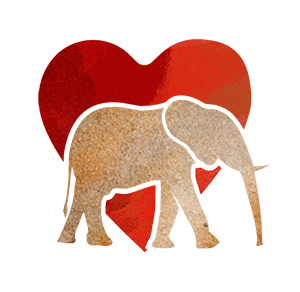Rafiki means ‘friend’ in Swahili. This is the story of a calf who asked for help, knowing he needed a friend if he was to survive.
On the morning of 4th July 2022, guests at Ashnil Samburu Camp awoke to a concerning sight: Emerging for breakfast, they were greeted by a lone baby elephant standing just outside their tent! Hoping his mother was nearby, staff left him alone. Several hours passed, however, and the calf continued to stand vigil outside the camp, plaintively staring at anyone who passed by.
It was later confirmed that the calf’s mother had been killed — yet another victim of human-wildlife conflict fuelled by the drought.
Across much of Kenya, 2022 has been blighted by drought. Samburu, in the north of the country, is experiencing its worst effects. What began as a prolonged dry season settled into a full-blown drought by mid-year, putting enormous strain on all who call Samburu home. As food and water become increasingly scarce, human-wildlife has intensified. Tragically, these altercations often end in fatal outcomes.
Lactating female elephants are particularly susceptible to human-wildlife conflict. If their baby is to survive, they must consume enough to both sustain themselves and fuel their milk supply. Left with little other option, they seek sustenance outside protected areas, which puts their lives at risk.
Such was the fate of Rafiki’s mother. Although he was on the larger side, Rafiki was still young enough to be highly vulnerable, particularly in the fraught drought conditions he now had to navigate on his own. Left untended, he would likely meet his mother’s tragic end. KWS contacted us to mount a rescue, and we mobilised an operation to take place the following morning led by KWS Vet Doctor Ngoroge.
In the meantime, Ashnil Samburu Camp staff plied the little calf with cut vegetation as he hovered around their camp . He was very gentle, happily remaining around the humans who showed him such kindness. When the midday sun got too hot, he retreated to the shade of a nearby tree. Come evening, he returned to his post outside the camp, interacting closely with the staff.
When our Keepers arrived, they were met by a remarkably friendly calf. Typically, orphans whose mothers were killed by humans are wary and distrustful. Rafiki had no such reservations. He was an elephant visibly relieved to be rescued and embraced his new Keepers with an open heart.
Rafiki arrived at the Nursery incredibly friendly and tame. He was riddled with worms which is often the case in an area heavy with livestock, but several weeks of specialised care worked its magic. We managed to eradicate the parasites and watched our boy blossom, his condition improving with each passing day.
Although he loves his human family unreservedly, Rafiki is quite shy around the other orphans. He tends to keep to himself, although he will happily stand close to his Keepers and share a cuddle with them. With time, we feel sure that he will continue to come out of his shell.
We have rescued many, many orphans over the years. Among all of them, Rafiki stands out as one of the friendliest towards his rescuers from the outset. He knew that he needed help and he sought it out. We feel very fortunate to call this brave little bull our rafiki — our friend.




























